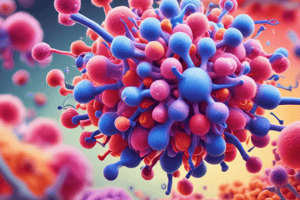Podcast
Questions and Answers
What is the effect of azoles and amphotericin B on membrane homeostasis?
What is the effect of azoles and amphotericin B on membrane homeostasis?
- Activating stress pathways, leading to increased membrane rigidity
- Disturbing cellular ergosterol content, leading to membrane destabilization and subsequent lysis of the cell (correct)
- Increasing cellular ergosterol content, leading to membrane stabilization and cell growth
- Inhibiting efflux pumps, leading to decreased membrane fluidity
What is the role of Hsp90 chaperone in stress signaling?
What is the role of Hsp90 chaperone in stress signaling?
- Activation of apoptosis under stressful conditions
- Involvement in protein folding and stabilizing many proteins involved in signal transduction (correct)
- Inhibition of protein synthesis under stress conditions
- Stimulation of efflux pump expression
What is the resistance mechanism found in many fungal species due to overexpression of specific efflux pumps?
What is the resistance mechanism found in many fungal species due to overexpression of specific efflux pumps?
- Inhibition of mitochondrial function
- Excretion of antifungal compounds (correct)
- Activation of stress pathways
- Increased cell growth
What is the effect of mitochondrial alterations on fluconazole resistance?
What is the effect of mitochondrial alterations on fluconazole resistance?
Antifungal compounds used in clinical therapy only target mechanisms present in fungi and do not affect human cells.
Antifungal compounds used in clinical therapy only target mechanisms present in fungi and do not affect human cells.
Invasive fungal infections are often caused by non-pathogenic fungi.
Invasive fungal infections are often caused by non-pathogenic fungi.
Successful clinical outcome of invasive fungal infections requires early diagnosis and effective antifungal therapy.
Successful clinical outcome of invasive fungal infections requires early diagnosis and effective antifungal therapy.
Overexpression of efflux pumps is the resistance mechanism found in all fungal species including echinocandin or polyene-resistant fungal isolates.
Overexpression of efflux pumps is the resistance mechanism found in all fungal species including echinocandin or polyene-resistant fungal isolates.
Mitochondrial alterations have no effect on fluconazole resistance.
Mitochondrial alterations have no effect on fluconazole resistance.
Cellular stress signaling does not provide protection against drug-induced stress conditions.
Cellular stress signaling does not provide protection against drug-induced stress conditions.
Changing the ratio of phospholipid species (PLs) does not impact membrane homeostasis.
Changing the ratio of phospholipid species (PLs) does not impact membrane homeostasis.
Acquired resistance to antifungal drugs is mainly a result of mutations or gene gain
Acquired resistance to antifungal drugs is mainly a result of mutations or gene gain
Echinocandins are equally effective against all Candida species
Echinocandins are equally effective against all Candida species
Polyene drugs cause cell death in fungi by binding to ergosterol in the fungal plasma membrane
Polyene drugs cause cell death in fungi by binding to ergosterol in the fungal plasma membrane
ABC or MFS transporters are the primary targets of echinocandins and polyene-resistant fungal isolates.
ABC or MFS transporters are the primary targets of echinocandins and polyene-resistant fungal isolates.
Mitochondrial alterations have been reported to facilitate fluconazole resistance in C. glabrata.
Mitochondrial alterations have been reported to facilitate fluconazole resistance in C. glabrata.
Hsp90 chaperone is not involved in stress signaling and protein stabilization.
Hsp90 chaperone is not involved in stress signaling and protein stabilization.
Flashcards are hidden until you start studying
Study Notes
Antifungal Drug Resistance: Mechanisms and Implications
- Drug resistance severely limits therapy due to few treatment options
- Intrinsic resistance occurs naturally without mutation or gene gain
- Acquired resistance results from evolutionary adaptation to antibiotics
- Azole resistance is substantial among Candida and Aspergillus species
- Mechanisms of azole resistance include upregulation of drug transporters and alterations in drug target
- Efflux pumps and modifications to the sterol biosynthesis pathway are common causes of azole resistance
- Polyene drugs bind ergosterol in fungal plasma membrane, causing cell death
- Polyene resistance is caused by loss-of-function mutations in ergosterol biosynthesis gene
- Echinocandins are effective against most Candida species but less active against Candida parapsilosis
- Echinocandin resistance is associated with genetic mutations in FKS genes
- Biofilms protect against antifungal compounds and increase adherence to host surfaces
- Mechanisms of antifungal resistance include structural target site alterations and metabolic bypass
Studying That Suits You
Use AI to generate personalized quizzes and flashcards to suit your learning preferences.




